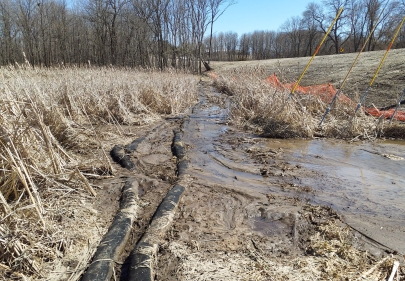
According to a Minnesota Pollution Control Agency (MPCA) enforcement investigation, Carver County and Valley Paving Inc. failed to protect nearby waters and wetlands from erosion and runoff during a highway safety improvement project in the fall 2022 and spring 2023 near Watertown, Minn. The violations caused further damage to some waterways already classified as impaired.
MPCA staff inspections in April 2023 confirmed that significant erosion along the four-mile project caused sediment-laden stormwater to flow into nearby Oak Lake, a pond, a wetland, and two unnamed streams. Oak Lake and one of the streams are included on the MPCA’s list of impaired waters, for containing excess sediments and nutrients.
The impacts to area waters occurred because the construction company failed to install erosion and sediment controls before winter and did not respond to rapid snowmelt runoff in the spring. Thousands of linear feet of sediment controls were missing, several storm drain inlets were unprotected, and many areas of soil along Highway 24 were exposed and not stabilized.
In addition to paying the $50,000 civil penalty, Carver County and Valley Paving corrected these issues to bring the construction area into compliance.
MPCA rules and regulations are designed to protect human health and the environment by limiting pollution emissions and discharges from facilities. When companies do not fully comply with regulatory requirements, the resulting pollution can be harmful to people and the environment.
When calculating penalties, the MPCA considers how seriously the violations affected or could have affected the environment, and whether they were first-time or repeat violations. The agency also attempts to recover the economic benefit the company gained by failing to comply with environmental laws in a timely manner.